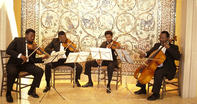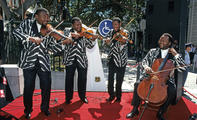Nostalgic Sounds
The nostalgic strings of the Soweto String Quartet (SSQ for short) are a welcoming sound for many South Africans. The elegant, African soul sound of the band has made them a popular outfit locally and internationally. SSQ’s music is beloved by many and stirs feelings of delight and sentimentality in fans around the world.

The group comprised of musicians Makhosini Mnguni, Sandile Khemese, Thami Khemese and the late Reuben Khemese. During the 1980’s, the group formed in the township of Soweto in Johannesburg. Three of the group members were already established musicians before the group formed.
It was a family affair from the get-go, brothers Reuben and Thami performed in Scotland in the 1970’s, while their third brother Sandile studied at the Dartington College of Arts as well as the Royal Northern College of Music in Manchester.
In the 1980’s they returned to South Africa and the Soweto string quartet was formed in 1989, with Makhosini taking the fourth spot in the group, Reuben played cello and Makhosini, Sandile and Thami played the violin. The group became a professional outfit in 1992 when they signed their first recording deal with BMG Africa. Their debut album, ‘Zebra Crossing’, was released in 1994.
During this time, South Africa was transitioning from apartheid into democracy. They played at the newly elected President Nelson Mandela's inauguration, from which they gained international recognition. They brought a modern twist on classical music, which made them quite popular with fans from diverse backgrounds.
The group released their second album called ‘Renaissance’ in 1996 and performed at numerous concerts, including The Nations Trust Two Nations Concert in Johannesburg and the 1998 Princess Diana memorial concert. Their third album 'Millennia' was also released in 1998, and their fourth in 2001 called ‘Four’.
In 2003 their fifth album ‘Our World’ mixed various genres of music together, such as jazz, reggae, traditional and Afrikaans music. The group later ventured into gospel music to honour their religious beliefs.
Twist of African Jazz

Grounded in classical music, the Soweto String Quartet, with its twist of dance rhythms from Kwela, the guitar beats of Mbaqanga, the saxophones and trumpets of African jazz and harmonious, easy-listening singing, succeeds in mixing Western and traditional sounds, producing music with a unique and vibrant rhythm.
Sandile mentioned during an interview once: "I think what the music of the SSQ brings to the fore is the diversity of different cultures existing in South Africa. The uniqueness of SSQ music lies in the use of intricate rhythms and melodies, which a lot of our people relate to with ease." The Soweto String Quartet defied stereotypes of a typical string quartet, four black musicians playing classical instruments and choosing music over the dusty streets of the township was unheard of at the time of their formation.
They faced the hardship of apartheid South Africa and the adversity of growing up underprivileged head-on and became internationally renowned musicians. The Soweto String Quartet is still revered for their music and remained popular up until 2016 when band member Reuben Khemese died unexpectedly and the group disbanded. However, it will always hold a place in the heart of South Africans who journeyed through troubling times with courage, hope, love and Soweto String Quartet music.